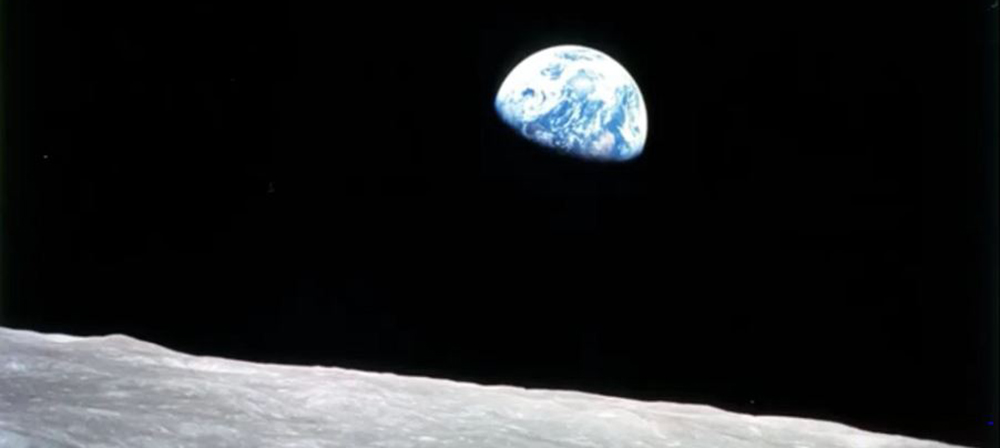
NASA Appollo 8 image shown during the April 23-25 Art-Science Festival.
Top Stories
(Note: Web articles are organized in descending order from the most recent to older articles.)
 Inspiring the Next Generation: Tour of the Illinois’ Materials Research Laboratory
Inspiring the Next Generation: Tour of the Illinois’ Materials Research Laboratory
May 1, 2024
"I love doing outreach and showing students cool things about the world. The reason why I got into science was because I wanted to understand why cool things happened, and now here I am, getting a PhD."
These words from Autumn Cook, a third-year Ph.D. student in chemistry, encapsulate the essence of an excursion by middle school students from Franklin STEAM Academy in Champaign to the Materials Research Lab (MRL) at the University of Illinois Urbana-Champaign on Friday, February 9.
The tour builds upon a collaboration between I-MRSEC, funded by the National Science Foundation (NSF), aimed at fostering middle school students' interest in science, engineering, and mathematics through direct engagement with Illinois faculty, graduate, and post-doctoral students. The initiative particularly targets students from marginalized and previously excluded populations who often lose interest in STEM fields after middle school.
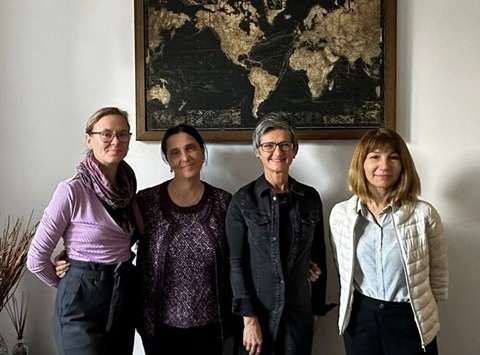 SOLIDarity EXperiences (SOLIDEX) through the Eyes of Children
SOLIDarity EXperiences (SOLIDEX) through the Eyes of Children
- Fulbright Alumni Collaboration -
Feb 14, 2024
What do children aged 11-13 in two countries think about solidarity? The SOLIDEX project is a research initiative funded through the Fulbright Romania examining how children in Romania and the United States understand the evolving contexts of solidarity.
Building upon their Fulbright experiences, at the University of Illinois Urbana-Champaign and the University of Bucharest, respectively, Catalina Ulrich Hygum and Luisa-Maria Rosu, were granted, in May 2023, a Fulbright Alumni Institutional Development Grant with a team including Dr. Leyla Safta-Zecheria from the West University of Timisoara, Dr. Marcela Slusarciuc (also a Fulbright scholar) from the University of Suceava Stefan cel Mare, Dr. Elena Ungureanu, and Madalina Coza, PhD student from the University of Bucharest.
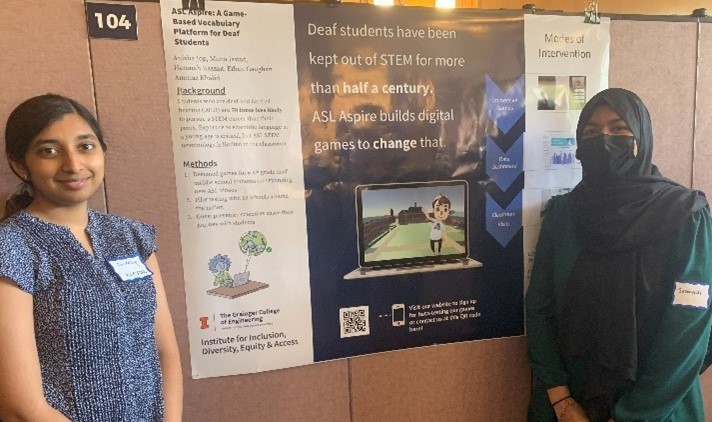 Students launch ASL STEM Vocabulary App Company
Students launch ASL STEM Vocabulary App Company
July 20, 2023
Engineering, scientific research, and innovation constantly create a dizzying array of technical terms. Keeping up with this expanding terminology presents unique challenges to deaf or hard of hearing (DHH) students who communicate using American Sign Language (ASL.) For example, Daniel Lundberg, a deaf chemistry professor at Gallaudet University, estimates that about 80% of chemistry terms have no established sign. This is an incredibly frustrating situation for students in middle school, where most students decide to pursue an interest in STEM.
 Innovation, Inspiration on display at the Undergraduate Research Symposium
Innovation, Inspiration on display at the Undergraduate Research Symposium
June 1, 2023
Walking into the Illini Union ground floor conference rooms during the Undergraduate Research Symposium is a dizzying and inspiring experience It’s a smorgasbord of inquiry and experimentation across academic programs and departments covering everything from autism in rats to NFL contracts. And more.
Undergraduate Research Week took place April 23-29, 2023, and culminated Thursday, April 27, 2023, in its signature event: the Undergraduate Research Symposium. Since 2008, undergraduates from across the University of Illinois Urbana-Champaign have presented their work in concurrent oral and poster presentations. The number of participants has grown, with over 800 gathered this year.
 What would you like to see – 3D printers? Magnets? Solar-powered racing cars? Robobrawl?
What would you like to see – 3D printers? Magnets? Solar-powered racing cars? Robobrawl?
March 28, 2023
The Engineering Open House (EOH) is the yearly event at the University of Illinois Urbana-Champaign that is entirely organized by students (with limited help from faculty) where they demonstrate what it means to be a Grainger Engineer.
EOH occurs Friday, March 31, and Saturday, April 1, from 9 a.m. to 4 p.m. daily. Use the schedule and map and shuttle and parking information to find your way around.
 Tour of Illinois’ Materials Research Lab through I-MRSEC sparks Franklin students’ interest in Materials Science
Tour of Illinois’ Materials Research Lab through I-MRSEC sparks Franklin students’ interest in Materials Science
March 1, 2023
“I can.”
That’s what Krisha, an 8th grader at Franklin STEAM Academy, said confidently when asked if she could see herself pursuing a college education in material sciences.
Krisha and 43 7th- and 8th-grade classmates from the Champaign middle school had completed a tour of the Material Research Laboratory (MRL) in early February. The tour was part of the Illinois Materials Research Science and Engineering Center (I-MRSEC) Musical Magnetism program that included visits to a scanning electron microscope, B80: Optical profilometer, Dynamical Mechanical Analysis, a virtual reality classroom, X-ray and fluorescence labs, and the clean room.
 Nobel Project’s End-of-2021 Zoom Bash Recaps Learning, Honors Students
Nobel Project’s End-of-2021 Zoom Bash Recaps Learning, Honors Students
February 1, 2022
The STEM Illinois Nobel Project held a special, end-of-the-year Zoom event celebrating its participating students’ achievements on Saturday, November 19, 2021. Showing up for the celebration were many of the roughly 78 Nobel Scholars—middle through high school students (and some of their parents)—who, over the past year, participated in one, or many, of the project’s Saturday Zoom outreach sessions. Part of the Chancellor’s STEM Illinois public engagement initiative, the Nobel Project, begun in fall 2020, has sought to expose participants to Computer Science (CS), CS-related areas, Community Health, Medicine, and even some sociology.
Just what is the Nobel Project? The brainchild of Professor Ruby Mendenhall, who heads up the program, it seeks “to give young people, especially young people of color, unprecedented access to these fields,” she explains, by giving them “tools where they can do life-changing, society-changing things.”
 It’s not magic, it’s physics
It’s not magic, it’s physics
Musical Magnetism program makes STEM fun, approachableJanuary 26, 2022
Recently, some Franklin STEAM Academy students walked into their library and discovered that a section had been turned into a physics lab.
On one side of a table were two glass beakers, a tall silver cylinder, and some safety equipment. And on the other side was a magnet, about the size of a hockey puck, floating and spinning above another magnet.
“What the …,” a seventh-grade student said, incredulously, upon spying what he later learned was a superconductor.
Before the student could finish, guest speaker Nadya Mason introduced herself and the day’s lesson. “Today, we’re going to look at what happens when materials get cold. What happens is extraordinary,” she said, piquing their interest. Mason is a Rosalyn Sussman Yalow Professor of Physics at the University of Illinois and director of the Illinois Materials Research Science and Illinois Materials Research Science and Engineering Center (I-MRSEC) on the Urbana-Champaign campus.
On Nov. 15, Mason and Pamela Pena Martin, I-MRSEC’s outreach coordinator, were at the Champaign middle school as part of the Musical Magnetism program, which Mason heads.
 Program prepares STEM educators to teach all students
Program prepares STEM educators to teach all students
November 30, 2021
This summer, a group of educators from across Illinois gathered at the 2021 CISTEME365 Virtual Institute to learn about engaging STEM activities they can do with their students—including building a projector with a lens and other materials—and the math, science, and engineering concepts behind them.
During their six days together, they also turned a metaphorical lens on themselves and their educational, political, and social systems, so that they could start to recognize their biases and systemic inequities that exist; understand the root causes; and ultimately, take steps to ensure that STEM opportunities for their students are equitable and inclusive.
“We all care about STEM and increasing participation of students who have historically been excluded and marginalized into these pathways,” said Meagan Pollock, a consultant, developer, and trainer for the National Alliance for Partnerships in Equity (NAPE). But because of biases and other factors we’re not always are of, we can unintentionally create environments that aren’t welcoming to or supportive of all students.
 Undergrads get a taste of research through I-MRSEC’s REU program
Undergrads get a taste of research through I-MRSEC’s REU program
November 11, 2021
This summer, Sophie Roberts took a leap forward on her career path to becoming a professor at a research university. Roberts, now a senior physics major at the University of Northern Iowa, was one of 10 undergraduates from across the US who participated in the Illinois Materials Research Science and Engineering Center’s (I-MRSEC) Research Experiences for Undergraduates (REU) program. “I wanted to learn more about materials science,” she said of her interest in participating in the program. “My background is condensed matter physics, which is related to materials science. So, I hoped to explore the field to determine which graduate programs to apply to – physics, materials science, or both.”
Now in its fourth year at the University of Illinois, the 10-week summer research program offers incoming college juniors and seniors studying engineering, physics, chemistry, materials science, or a related field the opportunity to work closely with faculty members to participate in some of the ongoing, interdisciplinary research programs on campus. Funded by a National Science Foundation (NSF) grant, the program also provides training to help the students in their professional development as scientists and engineers with particular emphasis on the skills related to communicating their scientific discoveries to help broaden its reach and make science more accessible.
 Goldstein’s Renaissance Engineering Summer Camp Incorporates Art, Design, Mechatronics, and Mentoring
Goldstein’s Renaissance Engineering Summer Camp Incorporates Art, Design, Mechatronics, and Mentoring
November 1, 2021
According to Industrial and Enterprise Systems Engineering (ISE) Teaching Assistant Professor Molly Goldstein, the idea for the brand new WYSE (Worldwide Youth in Science and Engineering) camp for 25 middle school students—Renaissance Engineering: Art, Design, and Mechatronics—came from a cardboard box. From that humble beginning, she and a pair of undergraduate students, Lorena Escamilla and Jesus Zavala, designed a virtual camp centered around two fun, hands-on, paper mechatronics activities sure to intrigue the younger students. Their goal was to pique participating middle schoolers’ interest in STEM. The hope was to firmly entrench the younger students, who are at a critical age, in the STEM pipeline. Here’s the story behind the story.
Because she has little kids at home, Goldstein had signed them up for an innovation camp for the summer of 2020, which hadn’t happened because of the pandemic. “They mailed us this kit—this box of wonderful, wonderful, cool things. And it sat there taunting me,” she admits.
 TechTogether Chicago to Redefine the Hacker Stereotype
TechTogether Chicago to Redefine the Hacker Stereotype
July 10, 2021
The nonprofit organization TechTogether formed with the aim to increase diversity in the hackathon community with their events and chapters. Now, the new chapter TechTogether Chicago aims to grow upon this mission with their work in organizing one of the few gender-focused hackathons in Illinois. In addition, TechTogether Chicago will be using the virtual environment as an opportunity to innovate and produce new workshops that can help inspire students to pursue careers in technology.
 Aerospace Engineering Launches Virtual Summer Camps to Pique Students’ Interest in Aero
Aerospace Engineering Launches Virtual Summer Camps to Pique Students’ Interest in Aero
July 2, 2021
Design an aircraft then watch it soar after launching it with a huge rubber band. Build a Mars lander to safely transport a real egg, then test the contraption by dropping it from a second story window. Zoom chat with a NASA flight director whose office provides a perfect view of mission control. These are just some of the informative and educational, yet fun activities 130 virtual campers from across the country got to experience during Aerospace Engineering’s (Aero’s) three summer 2021 camps.
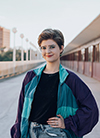 Undergrads Experience Materials Science Research Courtesy of the I-MRSEC REU
Undergrads Experience Materials Science Research Courtesy of the I-MRSEC REU
June 16, 2021
Ten undergraduate students who signed up for the I-MRSEC (Illinois Materials Research Science and Engineering Center) virtual Research Experience for Undergraduates (REU) are spending the summer of 2021 discovering what research is like. In addition, they're being given the opportunity to build a network plus gain skills that they'll most likely find helpful down the road—whether they go into a career in science or not. Participants are also hopefully getting a better idea of what they want to do career-wise. Some may even be determining whether grad school might be in their future, or if research—specifically Materials Science research—might be the career for them.
 MatSE Afterschool Academy to Introduce Students to Materials Science and Beyond
MatSE Afterschool Academy to Introduce Students to Materials Science and Beyond
June 14, 2021
Materials Science and Engineering (MatSE) Associate Professors André Schleife and Cecília Leal are currently working on developing the MatSE Afterschool Academy, which will help students learn more about MatSE as well as the college application process for students interested in the University of Illinois. Selected as a GIANT project, and funded by the IDEA Institute, Schleife and Leal will work towards providing students with the resources needed in future endeavors in MatSE.
 Taylor Tucker Embraces Multidisciplinary Interests—Engineering and Engineering Education—While Researching Task Collaboration
Taylor Tucker Embraces Multidisciplinary Interests—Engineering and Engineering Education—While Researching Task Collaboration
June 7, 2021
When Taylor Tucker arrived at Illinois for a Bachelor’s degree in Engineering Mechanics, she was passionate about one thing: engineering. Then she met Education Associate Professor Emma Mercier and discovered something else—engineering education research. While pursuing this interest, she found another kindred spirit—ISE Teaching Assistant Professor Molly Goldstein, who's also passionate about engineering education. Now, two degrees later, and planning on tackling a third, Tucker is still passionate about and successfully pursuing both disciplines, has figured out a way to somehow combine the two, and is making a difference in both areas.
-100.jpg) NSBE’s Michaela Horn Exposes Franklin Middle Schoolers to Science, CS, and What Studying Engineering at Illinois is Like
NSBE’s Michaela Horn Exposes Franklin Middle Schoolers to Science, CS, and What Studying Engineering at Illinois is Like
May 25, 2021
On May 12th of the Spring 2021 semester, during a busy week of finals, Michaela Horn, an Illinois CS student and member of the Illinois chapter of the National Society of Black Engineers (NSBE) took a break from studying to squeeze in Zoom visits to several 7th grade science classes of Malik Berry and Jacob Henss at Franklin STEAM Academy, a Champaign middle school with an emphasis on STEAM (Science, Technology, Engineering, Arts, and Mathematics). In addition to leading students—both in person and via Zoom—in hands-on activities, Horn divulged what it was like to be an Engineering student at Illinois, talked about the support NSBE was providing her, plus answered both students’ and teachers’ questions. Probably most important of all, though, she—a Black woman in Engineering—served as a role model for the younger students.
 Convertibles and Thunderstorms—Children’s-Book-Writing Duo on Their Way Thanks to Illinois Training and Encouragement from Mentors
Convertibles and Thunderstorms—Children’s-Book-Writing Duo on Their Way Thanks to Illinois Training and Encouragement from Mentors
May 19, 2021
When Taylor Tucker arrived at Illinois for a Bachelor’s in Engineering Mechanics, she dreamed of writing a children’s book. Then, she ran into BioE’s Jenny Amos, who encouraged her to pursue her life-long dream. When Nicole Dowling arrived on campus, she dreamed of drawing for a living. So, inspired by Graphic Design’s Eric Benson, who had assigned a project about sustainability, she decided to try a children’s book. Then, thanks to several serendipitous circumstances, the two met, and a children’s-book-writing collaboration was born. Their first book, Jenny Saves a Convertible was about STEM and overcoming adversity. The combination—STEM and overcoming, and even more so Dowling and Tucker—was so successful that their second book will also address STEM and overcoming—this time about a little girl and her fear of thunderstorms. Jenny and the Thunderstorm, perhaps?
 Liebenberg Espouses Mini-Projects to Engage Students Emotionally, Improve Learning in Engineering
Liebenberg Espouses Mini-Projects to Engage Students Emotionally, Improve Learning in Engineering
May 17, 2021
Mechanical Science and Engineering’s (MechSE) Professor Leon Liebenberg is a proponent of project-based learning—a student-centered pedagogy that suggests students learn better when they have the autonomy to actively explore real-world challenges and problems. So, in two of his lecture courses, ME 200 (Thermodynamics) and ME 400 (Energy Conversion Systems), a key component of both is mini-projects and E-portfolios. Why? He says they engage students emotionally. He goes on to explain the advantages doing so.
 BIOE435 Capstone Projects—BIOE Seniors Use Knowledge/Skills to Problem Solve
BIOE435 Capstone Projects—BIOE Seniors Use Knowledge/Skills to Problem Solve
May 12, 2021
There comes a point in a Bioengineering (BIOE) student’s career at Illinois when they get to demonstrate all the knowledge and skills they’ve acquired, in combination with their creativity and acuity in problem-solving, to come up with a viable solution to a real-world problem. Assistant Professor Holly Golecki’s BIOE 435 Senior Capstone Projects course is one such pivotal point for BIOE seniors—it’s a final chance to prove themselves prior to entering the real world as engineers. Thus, for the students, as well as their professor, the most exciting event of the Spring 21 semester was finally getting to present their completed projects at the May 4th BIOE Senior Design Virtual Symposium—something they’d worked toward for not just a semester—but their entire four years at Illinois, actually.
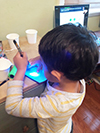 At Cena y Ciencias, Illinois Scientists Shine a (UV) Light on Fluorescence
At Cena y Ciencias, Illinois Scientists Shine a (UV) Light on Fluorescence
May 7, 2021
What is fluorescence? What causes it? On May 3rd, during the final Cena y Ciencias (CyC) outreach of the semester, students from Dual Language programs in several local schools got a chance to explore the unique property. Shedding light on the subject during the virtual (Zoom) outreach, and demonstrating the hands-on activities, were several native-Spanish-speaking scientists from Illinois. In addition to teaching kids some science and leading some fun hands-on activities—all taught completely in Spanish—the scientists also served as role models, demonstrating for the youngsters that if people who come from similar backgrounds and speak in their language can be scientists, they can too.
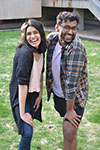 HackIllinois 2021 “Rekindled Connections” With The Tech Community
HackIllinois 2021 “Rekindled Connections” With The Tech Community
May 5, 2021
What exactly is HackIllinois? A student-run hackathon event developed to empower computer science students to produce technological solutions to problems society is facing, within one weekend. So, from April 9th to April 11th students at the University of Illinois Urbana-Champaign organized the annual student hackathon HackIllinois with the aim of developing projects on current problems facing society. Focusing on “Rekindling Connections” hundreds of participants from Illinois and beyond were able to network with industry professionals, mentors, and companies, while learning new skills through the workshops provided. HackIllinois staff as well learned how to adjust the once-in person event to a virtual event while maintaining the original mission of HackIllinois.
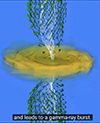 Illinois Art-Science Festival: Illuminating the Universe...from the Quantum World to the Cosmos
Illinois Art-Science Festival: Illuminating the Universe...from the Quantum World to the Cosmos
April 26, 2021
“The Art-Science Festival organizers invite you to celebrate the mysteries of the universe. From the quantum building blocks of matter to the elements of life on Earth to supernovae in faraway galaxies, our presenters will explore some of the biggest ideas in science. Through a dynamic mix of dance, music, fine arts, storytelling, and discussion, we will blur classical boundaries and take you on a journey through the cosmos.” – Festival organizers
The convergence of STEM (Science, Technology, Engineering, and Mathematics) and the Arts has made STEAM a buzzword over the last several years, especially in educational circles. However, to many scientists, researchers, and artists, art is not just an educational tool, but a viable means of expressing science. Enter a new buzzword: SciArt. So, during Illinois Physics’ first-ever Art-Science Festival @ Illinois 2021: The Illuminated Universe on April 23rd–25th, 34 presenters—artists, scientists, and sometimes a hybrid of the two—joined forces to present SciArt via a virtual “celebration of Nature, Humanity, and the Universe, explored through a confluence of the arts and sciences.”
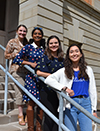 Ready. Set. Go! Illinois Engineering Seniors Prepared to Change the World
Ready. Set. Go! Illinois Engineering Seniors Prepared to Change the World
April 22, 2021
Every year, Illinois graduates a crop of female engineers who are skilled, well prepared, knowledgeable about not just their field, but engineering overall, and well equipped to navigate the vagaries of the engineering world. The spring 2021 crop is even more well prepared, having weathered the adversity of completing part of their junior year and all of their senior year under COVID-19 restrictions. Meet Shivani Ganesh, Berat Gulecyuz, Courtney Leverenz, and Eugenia Maldonado—future engineers who are eager to get out there and make a difference—to change the world for the better! Below, the four friends share why they came to Illinois, some of their achievements, challenges they overcame, a key nugget of what they learned at Illinois that they know they’ll be using down the road, their dream job/how they intend to change the world, and advice for incoming engineering freshmen.
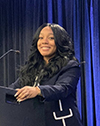 HML 2021 Virtual Health Make-a-Thon Gives Citizen Scientists a Shot at Making Their Health-Related Innovations a Reality
HML 2021 Virtual Health Make-a-Thon Gives Citizen Scientists a Shot at Making Their Health-Related Innovations a Reality
April 19, 2021
Eyes on the prize, twenty teams of “citizen scientists” from across the state—students, healthcare workers, educators, entrepreneurs, community members, and professionals—participated in the Spring 2021 Virtual Health Make-a-Thon competition on Saturday, August 17th. The prize? A Maker Lab Innovation coin that would entitle the bearer to $10,000-worth of resources from the University of Illinois’s Health Maker Lab (HML) network. The citizen scientists' goal? To come up with a health innovation that would make a difference.
 I-MRSEC’s Music Video for EOH ’21 Plugs Graphene, 2D Materials
I-MRSEC’s Music Video for EOH ’21 Plugs Graphene, 2D Materials
April 7, 2021
Although 2021’s Engineering Open House (EOH) was not the traditional live, on-campus event but virtual due to COVID-19, I-MRSEC researchers who are passionate about STEM outreach didn’t let that stop them. Unable to engage in person with the public, specifically the numerous children who usually attend, they figured out how to meet with them face to face anyway—via a music video. Their goals? To communicate about 2D materials research, to show the public how tax dollars are being spent, and to share benefits to be gained from scientific research. They also hoped youngsters watching might be intrigued and eventually pursue careers in research. Along with inspiring the public, they hoped to rekindle their own excitement by reminding themselves why they’d chosen science careers.
 HML 2021 Health Make-a-Thon Orientation Prepares Finalists for Competition
HML 2021 Health Make-a-Thon Orientation Prepares Finalists for Competition
March 30, 2021
Hopeful that “the next big idea in healthcare” could be theirs, on March 25th, the 20 finalists for the virtual Health Make-a-Thon competition to be held later in the spring (April 17, 2021) participated in an orientation session. Sponsored by the Carle Illinois College of Medicine (CI MED) and Illinois’ Health Maker Lab (HML), the Make-a-Thon Orientation familiarized the 20 teams of “citizen scientists” with key personnel, resources, competition logistics, and three special speakers provided contestants with relevant information that would come in handy during the Make-a-Thon, as well as their journey toward entrepreneurship.
 Musical Magnetism: Encouraging Franklin Middle Schoolers to Express Science Via the Arts
Musical Magnetism: Encouraging Franklin Middle Schoolers to Express Science Via the Arts
March 24, 2021
What does art have to do with science? And vice versa? Some might opine, “Absolutely nothing!” However, those who orchestrated and taught I-MRSEC’s spring 2021 Musical Magnetism curriculum to Franklin STEAM Academy’s seventh and eighth graders would beg to differ. They suggest that art—including music videos, haiku, glass sculptures—even tap dance—can be used to communicate about science. Thus, as part of the program, several Materials Science experts shared about their favorite science topics, with some addressing how specific arts might be used to express them. By the program’s end, students had not only learned about science—they’d even tried their hand at describing the science they’d experienced via various art forms.
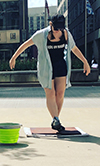 Paquette Conveys Her Love of Science, Dance to Franklin STEAM Students Via Musical Magnetism
Paquette Conveys Her Love of Science, Dance to Franklin STEAM Students Via Musical Magnetism
"As a kid, I found science fascinating; it felt like a good mystery book, and the more I learned, the more I understood about the world, as well as myself.” – Carmen Paquette
“I have always loved to dance. My parents constantly had music playing in the house growing up, and they often tell me that I came into the world dancing.” – Carmen Paquette
March 9, 2021
Carmen Paquette loves science. (Her dad, a material scientist, used to quiz her on the names and atomic numbers of the elements.) Carmen Paquette also loves tap dancing. (Her parents claim she came into the world dancing.) And she’s particularly passionate about expressing science via the arts—specifically, tap dance. So, when I-MRSEC planners decided that their spring 2021 edition of the Musical Magnetism curriculum at Franklin STEAM Academy would emphasize using the arts to convey science ideas, it makes sense that they would invite the summer 2019 I-MRSEC REU participant back to be involved. So, on February 18th, the materials scientist/professional tap dancer shared how she combines her two passions—science and dance—using dance to illustrate scientific concepts.
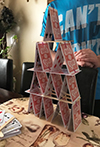 SWE’s Engineering Exploration Outreach Lives Up to Its Name
SWE’s Engineering Exploration Outreach Lives Up to Its Name
March 2, 2021
“What is engineering?” This is one question SWE Illinois sought to answer during its virtual Engineering Exploration outreach on Saturday, February 20, 2021. Their simple explanation was: “It’s the application of science and math to solve problems.” Their bit-more-in-depth exploration of this question included introducing the 77 middle school participants to several engineering disciplines and what engineers in these fields do. Sponsored by the Illinois chapter of Society of Women Engineers (SWE), with the assistance of other engineering students, the outreach taught the younger students briefly about a few disciplines; led them in some related hands-on activities; and showed them that engineers can come in all shapes, sizes, genders, and ethnicities.
 ChiS&E’s Family STEM Day Helps Chicago Youngsters Progress Along the STEM Pipeline Toward Engineering
ChiS&E’s Family STEM Day Helps Chicago Youngsters Progress Along the STEM Pipeline Toward Engineering
February 23, 2021
For Chicago kids (and parents) stuck inside because of the frigid winter weather, the ChiS&E Family Winter STEM Day on February 13th came just in the nick of time. A win-win for both the kids and their folks, the virtual outreach provided sessions and activities that were both educational and entertaining. For instance, parents discovered resources that might make sending their kids downstate to Illinois affordable. Plus, while doing creative, hands-on activities and bonding with the family over STEM, their kids learned a bit about the various engineering disciplines they were exploring. And hopefully, after successfully completing the activities, the kids discovered that they too have what it takes to become engineers someday.
 On Her First Foray into STEAM, Kathy Walsh Acquaints Franklin Students with Microscopy, Haiku
On Her First Foray into STEAM, Kathy Walsh Acquaints Franklin Students with Microscopy, Haiku
On this microscope
The lens moves up step by step,
Saves what's in focus.
February 17, 2021
The above haiku by Kathy Walsh describes one of the toys the MRL scientist gets to play with day in, day out—a 3D Optical Profiler. Specializing in nano/microscale surface topography, she uses the instrument to help researchers in their materials analysis by taking very accurate 3D measurements of the roughness or height of a material’s or specific object’s surface. So, when presented with the opportunity to participate in I-MRSEC’s Musical Magnetism curriculum and share her love of microscopy with Franklin STEAM Academy seventh and eighth graders, she jumped at the chance. Also thrilled that the program’s STEAM emphasis meant adding the Arts to STEM (Science Technology, Engineering and Mathematics), she further embraced the opportunity to expose the young people to another passion of hers—writing haiku about science.
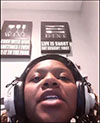 Illinois Undergrads Encourage ChiS&E CPS Students Toward Possible Careers in Engineering
Illinois Undergrads Encourage ChiS&E CPS Students Toward Possible Careers in Engineering
January 19, 2021
“This is an opportunity to contribute to the narrowing of the opportunity gaps.” – Lara Hebert.
Instead of sleeping in or vegging out on Saturday mornings during fall, 2020, Lara Hebert and around 16 or so engineering undergrads in the WYSE LEADers program, along with several others, exposed around 80 Chicago Public School (CPS) students to engineering. Devoting their mornings to virtual classes, the volunteers led the middle and high schoolers in some fun, hands-on activities ranging from Scratch to circuits to Arduinos. Have no idea what those are, what they do, and/or how they work? Well, about 80 CPS students now do, thanks to Hebert and her cohorts. Plus, students learned about engineering careers, tips on how to apply to Illinois, and what being a student at Illinois might be like.
 CISTEME365 Provides Year-Round PD/Community to Illinois Teachers in Support of Informal STEM Education Efforts to Underserved Students
CISTEME365 Provides Year-Round PD/Community to Illinois Teachers in Support of Informal STEM Education Efforts to Underserved Students
January 4, 2021
As part of its year-round emphasis, CISTEME365 (Catalyzing Inclusive STEM Experiences All Year Round) held an all-day professional development (PD) session on Wednesday, December 2nd, for educators from eight participating schools. An initiative of the University of Illinois’ Grainger College of Engineering, in partnership with NAPE (the National Alliance for Partnerships in Equity), CISTEME365 provided the PD session via Zoom, incorporating videos and printed materials, as well as using materials from kits that had been mailed participants. The goal of the session was to provide educators with equity/inclusion training, plus allow them to experience for themselves hands-on, project-based learning activities prior to having the students in their clubs try them out.







.jpg)
















